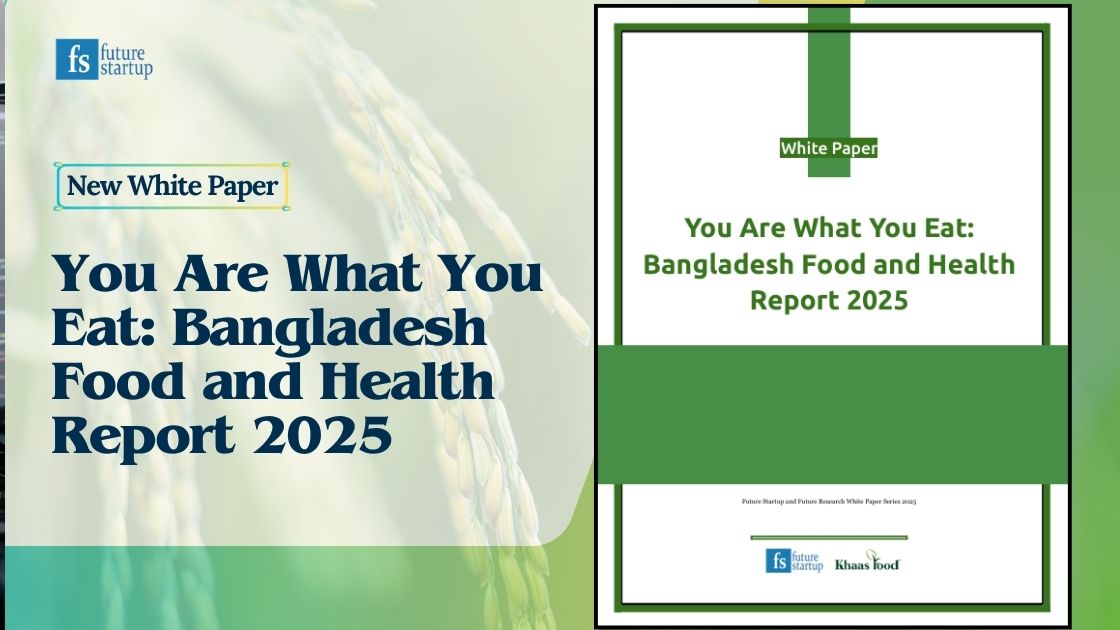
Future Startup and Khaas Food Limited are proud to announce the launch of "You Are What You Eat: Bangladesh Food and Health Report 2025," a comprehensive white paper that examines the critical relationship between food systems, dietary habits, and health outcomes in Bangladesh. Download the full report for free here.
The report, produced jointly by Khaas Food and Future Startup, offers an in-depth understanding of how food fundamentally shapes health and why this connection demands greater public and policy focus. It addresses key challenges including rising food safety concerns, increasing demand for safe and natural food, and the emergence of a dedicated safe food industry. By analyzing current obstacles and highlighting opportunities, the paper provides a strategic roadmap for stakeholders working toward a healthier food environment for all Bangladeshis.
Report Structure
The report is structured in two complementary parts:
Part One: The Foundational Role of Food in Health delves into food's critical impact on health and examines how escalating food safety issues pose a collective public health threat requiring urgent action.
Part Two: The State of Safe Food in Bangladesh—Market Dynamics, Key Trends, and Future Pathways explores the specific food safety challenges facing Bangladesh, investigates the growth of the safe food sector pioneered by emerging brands catering to health-conscious consumers, and proposes actionable recommendations to strengthen food safety standards nationwide.
This report underscores a fundamental truth: what we eat directly shapes our health. As Bangladesh grapples with mounting food safety challenges, understanding the rise of the safe food industry and implementing necessary policy shifts becomes essential to ensuring safer food for all.
The understanding that food plays a critical role in human health is deeply rooted in ancient civilizations and religious traditions, and is increasingly validated by modern science.
In Bangladesh, where food is central to cultural identity, as captured by the saying "Machh-e-Bhat-e-Bangali" (Fish and rice make a Bengali), this connection is exceptionally vital.
However, Bangladesh faces a dual challenge: a rising burden of diet-related Non-Communicable Diseases (NCDs), driven by changing dietary patterns, and pervasive food safety issues, including widespread food adulteration and unhygienic practices.
These challenges not only compromise public health but also significantly hinder economic growth and export potential.
There has been a growing consumer awareness around the critical importance of safe and healthy food. Accordingly, the market has responded to the food safety challenges with the rise of an emerging class of safe food brands, selling all kinds of food products that come with greater safety and quality assurances. The trend is slowly shaping the food market in Bangladesh.
But food safety challenges in Bangladesh, given the critical importance of safe and healthy food for public health, demand a comprehensive private and public sector response.
The white paper, "You Are What You Eat: Bangladesh Food and Health Report 2025", brings to light several critical insights:
A Public Health Crisis:
A Dynamic Market and Growing Demand for Safe Food:
Systemic Gaps and Vulnerabilities:
The report outlines a comprehensive, multi-pronged approach to address these critical areas, aiming to mitigate public health risks, improve nutritional outcomes, and unlock significant economic potential:
Regulatory Overhaul and Enhanced Enforcement:
Investing in Infrastructure and Technology:
Promoting Public-Private Partnerships and Farmer Capacity Building:
Consumer Empowerment:
Bangladesh’s food system stands at a crossroads. Action unlocks a significant $12 billion market potential in safe/organic foods, creates 500,000 new jobs, and contributes significantly to achieving Sustainable Development Goals (SDG) 2 (Zero Hunger) and 3 (Good Health and Well-being) progress.
Conversely, inaction risks a projected 30% rise in NCDs by 2030 and over $5 billion in annual trade losses.
By implementing these strategic recommendations, Bangladesh can transform its food sector, ensuring safe, nutritious, and affordable food for all its citizens, mitigating public health risks, and unlocking substantial economic potential.
Future Startup (https://futurestartup.com/) is an online knowledge platform covering entrepreneurship, business, expertise, and technology in Bangladesh. It democratizes access to entrepreneurial knowledge and opportunities through interviews, analyses, essays, newsletters, lecture series, and research.
Khaas Food is Dhaka-based innovative agri-tech startup working toward a Bangladesh where safe agro food is the standard, not the exception. The company aims to build a world where every individual has access to responsibly sourced, safe and nutritious products at its originality that support their health and the health of the environment.
